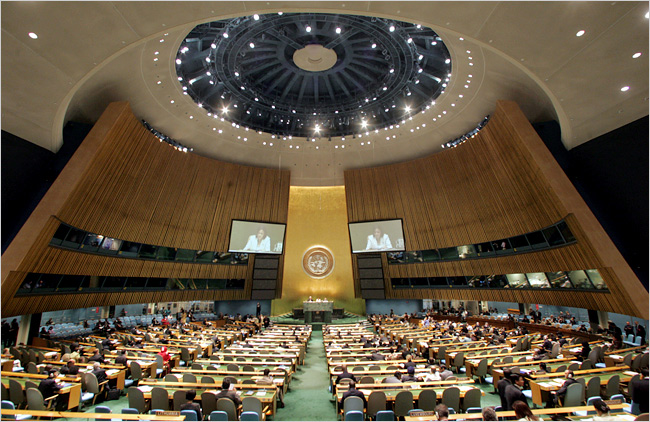December 27-2013

UN passes resolution with just as many yes votes as last year; Rohani charm gains regime nothing at UN
The UN General Assembly approved its annual resolution criticizing Iran for its human rights conduct with the same number of yes votes this year as last year, indicating that President Rohani’s milder approach to foreign policy hasn’t shaken the coalition critical of how Iran handles human rights.
The resolution passed the General Assembly Wednesday by a vote of 86-to-36 with 61 abstentions. Last year’s vote was 86-to-32 with 65 abstentions. So the net change was four of last year’s abstainers shifting their votes to no.
As the accompanying table shows the main change came in 2011, when the number of yes votes jumped and the number of noes plummeted. In the three years since, the voting has been fairly consistent.
On the same day, the General Assembly voted also to condemn North Korea by consensus and Syria on a vote of 127-13-47. Voting on a resolution condemning Myanmar was put off for a few days.
These four human rights resolutions have become a December ritual in the General Assembly, which has a membership of 193 states.
While the resolution on Iran expressed concern at serious ongoing abuses, it acknowledged pledges by Rohani on human rights issues such as eliminating discrimination against women and members of ethnic minorities and promoting freedom of expression and opinion.
It also praised Rohani’s plan to implement a civil rights charter and encouraged Iran “to take concrete action to ensure these pledges can result in demonstrable improvements as soon as possible and to uphold the government’s obligations under its domestic laws and under international human rights law.” The charter, however, will only apply to the government’s executive branch and not to the Judiciary and security forces, which are outside the president’s ambit but where most of the abuses occur.
The UN envoy on human rights in Iran, Ahmed Shaheed, told the a UN committee in October that Iran’s rights record should not be overlooked amid overtures to the West by Rohani.
His latest report concluded there had been “no sign of improvement” in the Islamic Republic’s adherence to international human rights standards.
The report, dated October 4, just two months after Rohani took office, didn’t distinguish between the old and new administrations. But the report painted a dark and foreboding picture, accusing the Islamic Republic of “systemic and systematic violations of civil, political, economic, social and cultural rights.”
The Islamic Republic dismissed the report as “flawed” and complained that Shaheed “has not paid sufficient attention to Iran’s legal system and Islamic culture and considers whatever he sees in the West as an international standard for the entire world.”
But Shaheed has noted in previous reports that he is measuring the Islamic Republic against standards that are global in application and are laid out in international agreements of which Iran is signatory.
